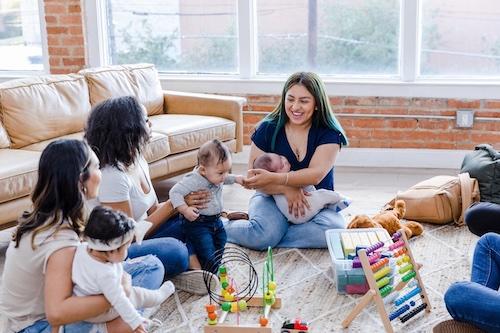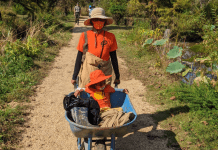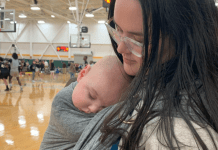Wondering how to build a postpartum village? We’ve all heard the saying “It takes a village to raise a child” when it comes to parenting. However, the true phrase should actually be “It takes a village to raise a MOTHER.” Cooking three meals a day for an entire family, taking care of doctor’s appointments, and maintaining a (fairly) clean house. Helping kids with homework, chauffeuring them to and from extracurricular activities, and making sure they’re meeting developmental milestones. Don’t forget, we’re also trying to build our own careers and pursue professional ambitions! Needless to say, motherhood can be an exhausting and overwhelming experience. This is especially true for postpartum moms without a “village.”

In today’s society, we are experiencing more stress than ever. The prevalence of anxiety and mental health disorders is increasing. Despite social media trying to connect us, many women feel lonelier and more isolated than ever before, especially new mothers. Becoming a mother is a monumental, life-altering transformation that changes your world instantly. During pregnancy and postpartum, a woman’s body undergoes dramatic physiological changes, but it is truly the internal psychological evolution that throws us for a loop. Our sense of self and identity shifts almost overnight, as we assume this new role and responsibility as a mother. We are expected to physically bounce back, return to life as normal, and be the quintessential Supermom who is “doing it all”. Of course, cherishing every moment with a smile on her face and a baby on her boob.
News flash: that’s not quite how the fourth trimester goes.
Traditional Postpartum Care: Nourishment and Support
In traditional cultures around the world, the postpartum period was a dedicated time of healing, nourishment and community-wide support for the mother and baby. Not only did family and community members step in to assist with infant care, but there was a strong emphasis on the mother’s recovery. Traditionally, this involved providing her with comforting, nutrient-dense meals, offering breastfeeding assistance, and allowing her extended periods of rest. This dedicated attention and hands-on support allowed mothers the time to build up their physical strength and mental stamina. Even today in South Korea, many new moms are taken care of at joriwons, recovery centers specifically designed to provide high-quality care during the two-week postpartum period.
Research shows that this dedicated “mothering” of the mother results in faster physical recovery, enhanced bonding with baby, reduced risk of postpartum mood disorders, and greater confidence in taking care of themselves and their baby. Furthermore, the mother’s prenatal and postnatal health status is directly related to the infant’s physical and cognitive development. New mothers that are sleep-deprived, undernourished, depressed, or struggling with other medical conditions are less likely to attend newborn visits, adhere to childhood vaccinations, and seek lactation assistance.

Modern Postpartum Challenges: Lack of education and resources
Sadly, many new mothers today do not have anywhere close to this level of postpartum care and support. Numerous factors contribute toward this including lack of family and social support, inadequate financial resources, racial and ethnic disparities, and inaccessibility to comprehensive maternal healthcare services. Add in the lack of prenatal education and postpartum preparation, demanding job responsibilities and abysmal maternity leave policies. Additionally, there is a lack of care coordination among providers. Moms end up shuffling from specialist to specialist looking for answers to their never-ending list of questions and concerns. Moms feel lost, confused, tired, and scared to share these struggles in fear of being judged for not doing things the “right” way.
As a mom of three and a Specialist in Prenatal and Postpartum Nutrition, I understand the challenges and confusion that moms face. How to: eat adequate meals with one hand, move your body after delivery, get your baby on a schedule, prioritize time with your other children, decide what vitamins you should be taking. It truly is the never-ending pile of laundry that continues to build in our minds.

Build your Village!
The transition to motherhood can be a humbling experience, but women should not have to go it alone. Having a postpartum “village” of maternal health experts, trained specialists, and trustworthy guides can ease you into motherhood with confidence, knowledge and support. People that you can rely on to teach you tips and tricks and answer all of your “Is this normal” questions, judgment-free.
However, a village’s true foundation is the community of genuine social relationships and connections. No one truly understands the challenges of new motherhood like other moms – nope, not even your partner! Mom friends understand that sometimes you just need a long shower, a hot latte, a 10 minute nap, or a messy crying venting session. No advice, no recommendations – just a moment to check in on each other and give a much-needed hug.
Your village is your support system. The people that will continue with you beyond the postpartum period to help you thrive in motherhood, not just survive. Because at the end of the day, a healthy happy mama is the foundation for a healthy, happy family.
What ways do you build your postpartum village? Be sure to look up and around to see ways to connect with fellow moms at events, playdates, community and conversation groups, etc. You can also start a neighborhood WhatsApp Chat for fellow moms to connect on a deeper level.















Thank you for this informative, honest and encouraging article. This will help more women than you realize. Please continue to help moms by writing more articles like this!